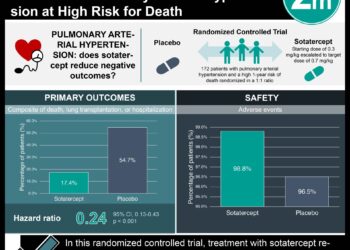Vitamin D may reduce the risk of hypertension
1. Increased vitamin D levels led to a reduction in systolic blood pressure and rates of hypertension.
2. Single nucleotide polymorphisms (SNPs) in vitamin D related genes DHCR7, CYP2R1, GC, and CYP24A1 influenced the occurrence of hypertension.
Evidence Rating Level: 2 (Good)
Study Rundown: Systemic vitamin D levels have been shown to be associated with a variety of disease states including cardiovascular disease and hypertension. Prior randomized controlled trials exploring the effect of vitamin D supplementation on cardiovascular outcomes have shown mixed results but lean toward a positive effect of vitamin D levels on the occurrence of hypertension. Furthermore, compared to other treatments, supplementation with vitamin D is a less costly alternative with fewer side effect risks making it a desirable treatment option for clinicians and patients. The authors of this study utilized a genetic approach to explore the association between vitamin D levels and hypertension. The study benefited from a large study population and a Mendelian randomization approach allowing for an estimate of lifelong vitamin D concentrations rather than episode specific measures of vitamin D. This study, however, suffered from the limitation that the initial meta-analysis of the D-CarDia cohorts failed to show an association between the synthesis allele score and hypertension (p=0.08) and only after increasing the sample size by inclusion of other cohorts was statistical significance between these measures achieved (p=0.0498), casting some doubt as to whether this observation was simply made by chance.
The study was funded by British Heart Foundation, UK Medical Research Council, and Academy of Finland.
Click to read the study, published today in The Lancet Diabetes & Endocrinology
Relevant Reading: Vitamin D status and ill health: a systematic review
Study Author, Professor Elina Hyppönen, University of South Australia, South Australian Health and Medical Research Institute, talks to 2 Minute Medicine:
“Mendelian randomization helps to determine cause and effect because by using genetic data we can better avoid confounding, reverse causation, and bias. However, because we cannot exclude the possibility that our findings were caused by chance, they need to be replicated in an independent, similarly powered study. Further studies using randomized controlled trials are also needed to confirm causality and the potential clinical benefits of vitamin D supplementation.”
In-Depth [Mendelian randomization study]: This study meta-analyzed data gathered from over 30 cohorts (n = 108,173) comprising the D-CarDia collaboration supplemented by reports from the International Consortium on Blood Pressure (ICBP), the Cohorts for Heart and Aging Research in Genomic Epidemiology (CHARGE) consortium, and the Global Blood Pressure Genetics (Global BPGen) consortium. Vitamin D allele scores were generated from four single nucleotide polymorphisism (SNPs) – DHCR7 rs12785878, CYP2R1 rs12794714, GC rs2282679, and CYP24A1 rs6013897 – as proxy estimates for lifelong vitamin D levels and these scores were compared with incidence of hypertension. Allele scores were shown to be strongly associated with 25-(OH)-D concentrations (synthesis score: β 2.83%, 95% confidence interval [CI] 2.48-3.18, p=2.70×10-55, R2=0.5%; metabolism score: β 5.38%, 4.67-6.08, p=5.93×10-50, R2 = 1.4%). It was found that higher vitamin D concentrations were associated with a reduction in systolic blood pressure (β per 10% change, -0.12 mm Hg, 95% CI -0.20 to -0.04; p=0.003) and reduced odds of hypertension (OR 0.98, 95% CI 0.97-0.99; p=0.0003) regardless of age, sex, BMI, or blood pressure measurement method.
More from this author: Schizophrenia linked with higher rates of violence, suicide, and early mortality;Overall improvement in management of high blood pressure between 1994 and 2011;Link between early life antibiotic use, asthma exacerbations, and impaired viral immunity;Structural and neurobiological foundations of suicide, a review;Buccal administration of dextrose gel effective in treatment of neonatal hypoglycemia
Image: PD
©2012-2014 2minutemedicine.com. All rights reserved. No works may be reproduced without expressed written consent from 2minutemedicine.com. Disclaimer: We present factual information directly from peer reviewed medical journals. No post should be construed as medical advice and is not intended as such by the authors, editors, staff or by 2minutemedicine.com. PLEASE SEE A HEALTHCARE PROVIDER IN YOUR AREA IF YOU SEEK MEDICAL ADVICE OF ANY SORT.





